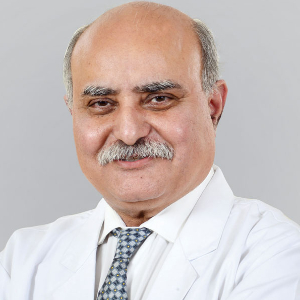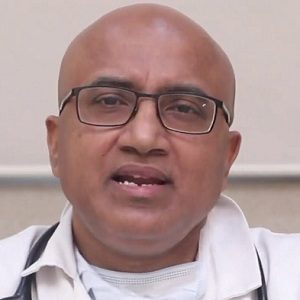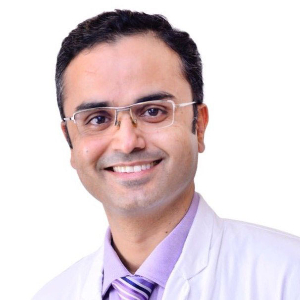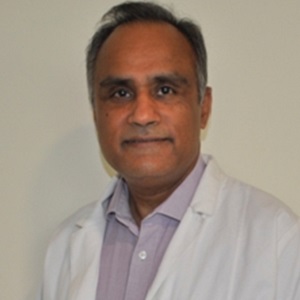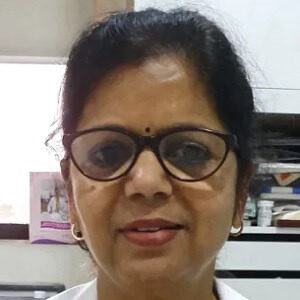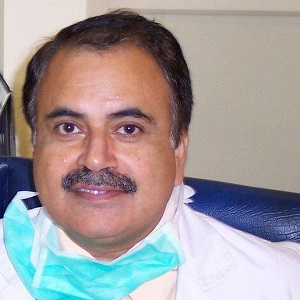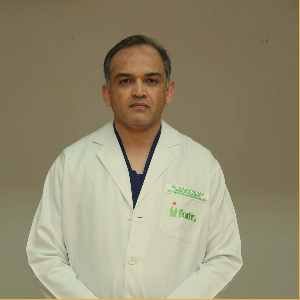Best Doctors in India for Alcoholic Hepatitis Treatment
- Cardio Thoracic & Vascular Surgeon, New Delhi, India
- Over 30 years’ experience
Profile Highlights:
- Dr. Ajay Kaul is a leading name in the field of Cardiothoracic and Vascular Surgery in India with over 3 decades of experience.
- He specializes in Coronary Bypass surgery and is one of the best with the highest number of total arterial coronary bypass surgery (4000+) by using two internal mammary arteries from the chest and without any cuts on arms and legs.
- He is also an expert in minimally invasive cardiac surgeries (MICS) and has performed more than 4000 MICS which is the highest by any cardiac surgeon in India.
- ENT Surgeon, Otorhinolaryngologist, Head and Neck Surgeon, New Delhi, India
- Over 30 years experience
Profile Highlights:
- Dr. Kalpana Nagpal is an ENT/Otorhinolaryngologist in India with extensive expertise. She has nearly three decades of experience in performing Microscopic and Endoscopic Surgeries for sinus infections, sebaceous cysts, epistaxis, tonsillitis, and otoplasty.
- Dr. Nagpal is a senior consultant for ENT at Indraprastha Apollo Hospital. She treats patients with congenital ear problems, orbital and optic nerve decompression, and tonsillectomy in both children and adults. Her area of expertise is Head & Neck Surgery.
- Dr. Nagpal also serves as the President of the Women Association of Otolaryngologists and is active in academics.
- Medical Oncologist, New Delhi, India
- Over 15 years experience
Profile Highlights:
- Dr. Dipanjan Panda is one of the well-known medical oncologists in India, having 15 years of expertise in treating bone and soft tissue cancers and gastrointestinal cancers.
- He is credited with starting the country’s first anticancer departments and PDCC program. Dr. Panda developed a medical oncology unit at Indraprastha Apollo Hospital in New Delhi, in association with the Institute of Liver and Biliary Sciences. He is currently working at Indraprastha Apollo Hospital in New Delhi as a Senior Consultant, Medical Oncology.
- Dr. Panda has written twenty peer-reviewed papers in national and international journals. He has presented numerous talks at global forums.
- Surgical Oncologist (Musculoskeletal), New Delhi, India
- Over 20 years’ experience
Profile Highlights:
- Dr. Akshay Tiwari is a well-known Musculoskeletal Surgical Oncologist who holds an extensive experience of close to two decades and finds interest in the treatment of musculoskeletal cancer patients.
- He is trained in surgery for cancers of the bone and soft tissues and has performed more than 1000 surgeries for bone and soft tissue tumors.
- Gastroenterologist, New Delhi, India
- Over 20 years’ experience
Profile Highlights:
- Dr. Vivek Raj is a well-known Gastroenterologist with a clinical experience of 20 years in the field.
- His medical interests are managing ERCP, Liver Diseases, and Colonoscopy.
- He is a member of various renowned organizations.
- Obstetrician & Gynaecologist, New Delhi, India
- Over 35 years’ experience
Profile Highlights:
- Dr. Sushma Prasad Sinha is one of the top Gynaecologists and Obstetricians in India, having over 35 years of experience. She is primarily a well-known name in infertility & IVF with an unrivalled success rate.
- Dr. Sinha specialises in the ovarian cyst, fibroid, endometriosis, and ablation laparoscopic procedures; hysteroscopic surgeries, vaginal surgeries, tubal reconstruction, Colposcopy, loop cone cervical biopsies, and fertility preservation surgeries.
- She works in Indraprastha Apollo Hospital as an obstetrician and gynaecologist.
- Dr. Sushma Prasad Sinha has also written articles for many medical publications and a book chapter titled “Effective Approach to Basic Evaluation of Subfertile Couples.”
- Dentist and Dental Surgeon, New Delhi, India
- Over 35 years’ experience
Profile Highlights:
- Dr. Neeraj Verma is one of those prominent dentists in India who is having more than 35 years of experience.
- He is the vice president of the Indian Dental Association in Delhi.
- Due to his sound experience in Dentistry, Dr. Neeraj Verma received the Vishisht Seva Medal by the President of India.
- Urologist, Gurugram, India
- Over 20 years’ experience
Profile Highlights:
- Dr. Rajiv Yadav is a reputed urologist in India with great experience in Prostate, Kidney & Urinary bladder disorders.
- His clinical focus is on Robot-assisted Laparoscopic Surgery for Prostate Cancer, Kidney Cancer, and Urinary bladder cancers.
- He completed his training at the most prestigious institutes including AIIMS, Delhi & Weill Cornell Medical & New York-Presbyterian Hospital, USA.
- Neurologist, New Delhi, India
- Over 42 years' experience
Profile Highlights:
- Dr. Anoop Kohli is one of the well-known Neurologists in India, having 42 years of clinical experience.
- He is interested in the treatment of Migraine, Brain Haemorrhage, Paralysis, Parkinson’s disease, Stroke, Paraplegia, Fits, and Meningitis.
- Dr. Kohli is a senior consultant at Apollo Hospital, New Delhi, and a pioneer, who first devised an intravenous thrombolytic treatment and developed the first Trans-Cranial Doppler Lab of India at Apollo Hospitals, New Delhi.
- Dr. Anoop Kohli is excellent at surgical intervention and therapies. He has contributed 40 publications to national and international journals.
- Gastroenterologist, Gurugram, India
- Over 30 years’ experience
Profile Highlights:
- Dr. Gourdas Choudhuri is a gastroenterologist, medical educator, researcher of national eminence, as well as a columnist and philanthropist.
- He completed his training at the All India Institute of Medical Sciences in New Delhi and was the first specialist to start Endoscopic Ultrasound (EUS) and Extra Corporeal Shockwave Biliary Lithotripsy (ESWL) in India.
- It was under Dr. Gourdas Choudhuri’s expert leadership and supervision the prestigious department of Gastroenterology at Sanjay Gandhi PostgraduateInstitute of Medical Sciences, Lucknow, developed into one of the top five in the country.
Best Hospitals in India for Alcoholic Hepatitis Treatment
ALCOHOLIC HEPATITIS
Alcoholic hepatitis is a liver infection, which is mainly caused by frequent, heavy use of alcohol. Fat can build up in the liver cells, which might lead to inflammation as well as scarring of the liver.
Alcoholic hepatitis might be mild or severe. A patient might even need a liver transplant if proper treatment is not provided, or if they don’t stop consumption of alcohol.
It is also notable that all heavy drinkers don’t develop this condition, and sometimes this condition even develops in people who drink moderately. However, if you are diagnosed with this condition, it is important for you to quit drinking alcohol. People who continue drinking alcohol might face a huge risk of serious liver damage as well as death.
Symptoms
Depending on the amount of damage to the liver, the symptoms can vary. If you are having a mild form of the disease, you might not even experience any symptoms at all. However, as the damage continues to grow, you might experience the following:
- Changes in appetite
- Dry mouth
- Weight loss
- Pain or swelling in the abdomen
- Jaundice, or yellowing of the skin or eyes
- Fever
- Nausea and vomiting
- Easy bleeding or bruising
- Changes in your mental state, including confusion
- Fatigue
The symptoms of this condition are similar to those caused by a few other health conditions. Therefore, if you develop any of these symptoms, it is best to get a proper diagnosis as well as begin treatment.
Causes & risk factors
Alcoholic hepatitis generally develops when the alcohol you drink causes damage to your liver. However, it is not clear why alcohol does this damages only to some heavy drinkers.
Few factors that are known to play a role in this condition include:
- The body’s process that breaks down alcohol produces some toxic chemicals
- These chemicals can trigger inflammation that can destroy the liver cells
- Thus, over time, scars replace healthy liver tissue, thus interfering with the function of the liver
- This irreversible scarring, which is also termed cirrhosis, is the final stage of alcoholic liver disease
If you have hepatitis C and continue to drink, even moderately, you are more likely to develop cirrhosis.
Some heavy drinkers are also malnourished because they don’t eat a proper balanced diet. Alcohol and its byproducts also prevent the body from absorbing nutrition properly. Lack of nutrition can contribute to liver cell damage.
Some other risk factors that can lead to this condition include:
- Your sex- Women are usually at a higher risk of developing alcoholic hepatitis since the way alcohol is processed in women is different.
- Binge drinking- Having over five drinks within two hours for men and four or more for women can increase the risk of alcoholic hepatitis.
- Obesity- Heavy drinkers who are overweight are also more likely to develop alcoholic hepatitis and to progress from that condition to cirrhosis.
- Race and ethnicity- Hispanic and Negroid people might be at higher risk of alcoholic hepatitis.
- Genetic factors- According to studies, there may be a genetic component in alcohol-induced liver disease. However, it is difficult to separate genetic and environmental factors.
Diagnosis
If you are showing symptoms of alcoholic hepatitis, your doctor will first inquire about your medical history and alcohol consumption. Next, he/she will perform a physical exam to see if you have an enlarged liver or spleen. They might also need a few more tests to confirm your diagnosis, such as:
- Complete blood count (CBC)
- Liver function test
- Ultrasound of the liver
- Abdominal CT scan
- Blood clotting tests
In some cases, a liver biopsy might also be needed to confirm the diagnosis of alcoholic hepatitis. A liver biopsy requires your doctor to remove a tissue sample from your liver, which is then tested in the lab. This method helps to show the severity and type of liver disease.
Treatment
Stopping alcohol consumption is the most important treatment for alcoholic hepatitis. There is no cure for this condition, but treatment can help in reducing or eliminating symptoms, or stopping its progression.
It is also important to note that scarring of the liver is permanent, but treatment can aim to restore as much function as possible.
Dietary changes
Medication
Liver transplant
The best hope of recovery is to be aware of the signs and symptoms as well as to reduce, manage, or if possible, completely stop consumption of alcohol.
Complications
Alcoholic hepatitis might lead to severe other complications such as:
- Enlarged veins (varices)- In this condition, blood that is unable to flow freely through the portal vein, can back up into other blood vessels in your esophagus or stomach.
- Hepatic encephalopathy- This condition can be caused by the buildup of toxins if your damaged liver is unable to remove all the toxins from your body. It involves confusion, drowsiness, and slurred speech.
- Ascites- Ascites is a condition in which the fluid that accumulates in the abdomen may get infected and thus, require treatment with antibiotics. Although this condition is not life-threatening, it can be a sign of advanced alcoholic hepatitis, or cirrhosis.
- Kidney failure- A damaged liver affects blood flow to the kidneys, thus resulting in kidney failure.
- Cirrhosis- The scarring of the liver might lead to liver failure.
Prevention
Alcoholic hepatitis might be prevented if you take the following steps:
- Drink alcohol in moderation, if at all- For healthy adults, moderate drinking means no more than one drink a day for women of all ages and men older than 65, and not over two drinks a day for men aged 65 and younger. However, if you prevent all alcohol, it is a certain way to prevent this condition.
- Check before mixing medications and alcohol- Ask your doctor if it’s safe to drink alcohol while you are taking medications. Consider reading the warning labels on over-the-counter medications as well. Don’t drink alcohol when you are taking medications that warn of complications when combined with alcohol.
- Protect yourself from hepatitis C- Hepatitis C is an infectious liver disease that is caused by a virus. If it is left untreated, it may lead to cirrhosis. If you are having hepatitis C and you consume alcohol, you’re generally more likely to develop cirrhosis than if you don’t drink.

